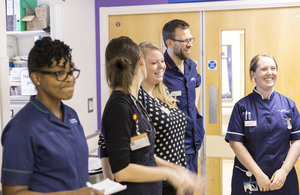£25 million boost for nurse training
Nurses and other healthcare students will benefit from expanded virtual training, and the launch of a new national critical care qualification for qualified nurses.

- Up to £15 million for English universities to rapidly expand simulated learning for nursing and other healthcare students this year, providing flexibility during the pandemic
- £10 million for a new nationally recognised critical care qualification to boost the qualified workforce
The government has announced a £25 million boost for nurse training which will see nurses and other healthcare students benefit from expanded virtual training, and the launch of a new national critical care qualification for qualified nurses.
Up to £15 million of the funding will go to universities to invest in new simulated training facilities and technology. This can involve the use of virtual reality (VR) technology, manikins, role play, and smart phones, tablets or computers, allowing nursing students to practise their clinical skills in a safe environment. They will be able to train themselves on clinical procedures and simulate a realistic clinical setting with the support from experienced colleagues.
It comes after the Nursing and Midwifery Council announced up to 300 of the 2,300 clinical practice hours nurses need to complete during their degree can now be completed in simulated environments, due to the pandemic.
Alongside this, the government will also invest £10 million to develop a new, nationally recognised, critical care qualification for qualified nurses, which can also be accessed by a number of Allied Health professions. This will be rolled out for immediate use during the pandemic to help boost the number of people able to work in critical care.
Minister for Care Helen Whately said:
We are committed to training more nurses for the NHS and supporting professional development, and this £25 million investment will provide more innovative training opportunities for nurses.
Whilst there is no substitute for face to face training on wards, simulated training is a vital part of the curriculum and provides a safe space for students to develop their skills. Thanks to our investment, more nursing and other healthcare students will be able to benefit from the latest innovations and new technologies to better support their learning at this time.
The funding will also recognise our critical care nurses, who have played a crucial role during this pandemic, with a new nationally recognised qualification.
Professor Mark Radford, Chief Nurse, Health Education England said:
We welcome this support on simulation hours from the NMC in support of students, which will build on universities’ existing expertise in the education of healthcare workers for the NHS and social care. During the COVID pandemic, we recognise and very much value the massive contribution of our students and universities, along with all NHS staff. This further investment will directly support students to further their studies and qualify.
Working with critical care organisations, we have rapidly designed new innovative education options to provide additional support to the NHS. It’s vital that we look for as many diverse and flexible routes into training as possible, and this announcement will help make the most of the technology available to support nurses on that journey.
Dr Katerina Kolyva, Executive Director of the Council, said:
The COVID crisis has put unprecedented pressure on practice placement capacity for students. Many universities have responded by increasing student exposure to simulated experiences. The most up to date technology offers some amazing opportunities for learning but is also expensive. We appreciate the flexibility shown by professional regulators over the past year, which has allowed universities to use simulation more creatively on some courses.
This new investment will go some way to helping universities provide the equipment and facilities necessary to take advantage of this flexibility. Over time sustained investment in infrastructure and staffing would allow the nation to educate more nurses, midwives and allied health professionals for the health and social care sector.
Matthew McClelland, Executive Director of Strategy and Insight at the Nursing and Midwifery Council, said:
We’re committed to supporting our students and professionals during the challenges and workforce pressures posed by the pandemic.
That’s why we introduced our recent, temporary COVID-19 recovery standard, which provides greater flexibility for educators to use simulated learning where nursing students aren’t able to go into or experience practice placements in the usual way.
I really welcome this announcement by the government, which will support education institutions in England to innovate and invest in simulation and will also help to expand the critical care workforce.
Increasing simulation hours and training facilities will help reduce the pressures on clinical placement capacity across the NHS and social care during the pandemic, and help students get the training they need to qualify and join the workforce.
The new critical care qualification will help staff to develop skills which can be transferred across organisations, providing them with more flexibility to work at hospitals across the country.
Background information
The £15 million funding will be provided via immediate grant allocations to universities to help to rapidly expand student nurse simulated learning from this year.
More detail will be published on the qualification in due course.
Case studies
Birmingham City University is running online simulations for third year students on the Transition to Qualified Practice module, with actors playing patients in ward-based scenarios to develop their clinical decision-making skills.
The Royal College of Nursing has developed the Introducing Critical Care programme, where students can print flash cards and access bite-sized learning resources on their smartphones for more flexibility.